The Black Phone (2021)
Directed by: Scott Derrickson
Written by: C. Robert Cargill, Scott Derrickson
Starring: Ethan Hawke, Madeleine McGraw, Mason Thames
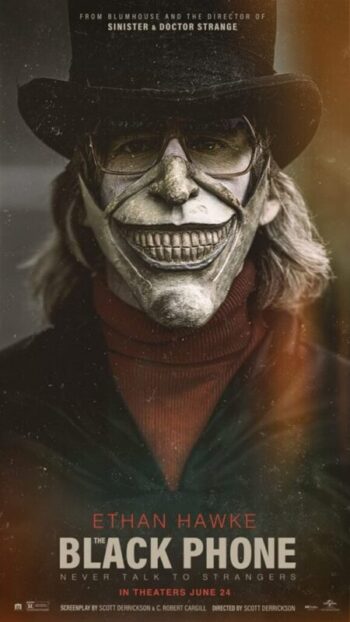
THE BLACK PHONE
Directed by Scott Derrickson
It’s understandable Joe Hill doesn’t go by his birth name Joe King. Aside from the obvious reason people may not take him seriously, he’s the son of the most important horror author of all time: Stephen King. And boy, does that give him big boots to fill. Fortunately, it wasn’t a windy day when the apple fell from the tree, and Hill has a solid career of his own, including Locke and Key, N0S4A2, In the Tall Grass and Horns (all of which have middling adaptations). The Black Phone comes from one of his stories – by his standards, not an especially great 30 pager – which uses a serial killer scenario as the basis for a campfire ghost tale. It also reunites director Scott Derrickson with his Sinister co-writer C. Robert Cargill and leading man Ethan Hawke. Combined, they do a commendable job of expanding the story.
The basics are much the same: Finney Shaw is a smart but shy kid who gets captured by a man in a black van, The Grabber. However, we also get a glimpse into a very violent 1970s childhood, where he and his sister (possibly psychic) Gwen deal with an abusive father and the many local bullies. Meanwhile, the kids around them stab each other, fight until their knuckles bleed, or go missing. It’s an unflinching world of violence only hinted at on the page. Also, where the villain in Hill’s source material was an overweight, sweaty nonce archetype, he’s reimagined as a mysterious, troubled spectre with creepy masks and a more developed MO. Once in his soundproof basement, where they play “Naughty Boy”, Finney starts receiving calls from a disconnected phone (bet you can guess the colour) – voices of children claiming to be the killer’s former victims.

It’s a nice idea: the dead aren’t lost; if we listen to them, they can help us survive. Only with the premise revolving around someone stuck in a basement even the most naive viewers can predict where the action will go for large parts, i.e., nowhere. The story focuses on Finney and his captor in one place, so we know he can’t get out until roughly the third act at the earliest (this is not to comment on whether he does or not). Still, the film does a compelling job of developing the story and, without spoilers, adds enough elements you won’t have seen before. You’d think a kid in a room with a phone, which provides the bulk of the jump-scares, would have few moments to get under your skin. But it finds a way then, ironically, doesn’t want to leave.

Hawke helps. Unusually he’s playing the villain and makes the most of a script that gives us too little to understand him but just enough that we have a starting point. There’s evidently sadism, but also guilt, shame and possibly trauma. Initially, I was underwhelmed by how little we got to see of him. Though as it went on, I warmed to his unusual cadence, stillness and the mystery he creates. Where some actors treat the masks as something to hide behind, he works with them – making them an extension of who his character is and his physical performance. He’s potentially an icon in waiting. I also liked that the movie stays unapologetically supernatural – we don’t need to know why the dead can contact Finney through the phone, nor do we need to get why Gwen has her dreams. On this, maybe the film’s best bit is Finney and Gwen’s brother-sister relationship.

Mason Thames and Madeleine McGraw are brilliant, empathetic actors who let their guard down and delve into the darker bits of the movie. Combined, they make for utterly believable siblings. Watching them tease each other and share in-jokes is a joy that makes the profoundly uncomfortable scenes with their drunken dad so hard to watch. Still, they also find sweetness in how they look out for each other during it. Again, excellent writing and casting – it’s a shame when they get split up. Still, once Finney goes missing, about a third of the running time is handed to her as she tries to help a police investigation to get him back. For me, this was more enjoyable than the main plot for significant stretches. There’s an atmospheric suburban paranoia about it, with masterful attention to detail, and I liked seeing her struggle with the second sight she appears to have inherited from her mum. Amidst the second act slump, it helps pick up the slack. Mostly.
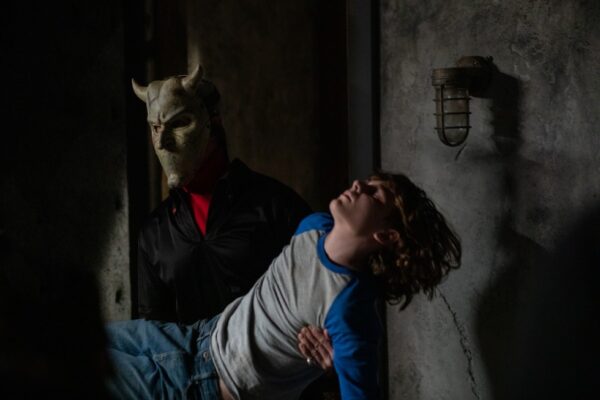
The frustrating thing is it almost all comes together to be something truly special. However, despite the impression from a good montage, with a cool 70s needle-drop, the different strands aren’t entirely tied together. Sure, they converge – but not in a way that does each justice. A potentially exciting relationship goes almost wholly unexplored (to be fair, it isn’t elaborated upon in the story either), and though the police appear a lot, they don’t do a lot. Of course, not every scene has to be part of the end game, and often it’s rewarding to see small character moments even if they aren’t essential. The time spent building up the communal response to the Grabber also really helps sell a sense of danger, along with a level of intrigue. Still, in the weaker moments, it’s hard not to see its origins as a short that’s been expanded. Which I guess is understandable since it is. On that point, I’m glad to see an adaptation of Joe Hill’s work that succeeds where others have failed. Hopefully, the first of many.
Rating: 






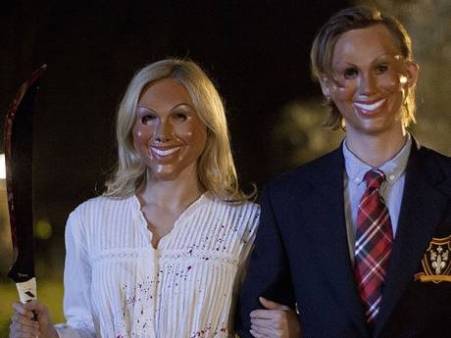
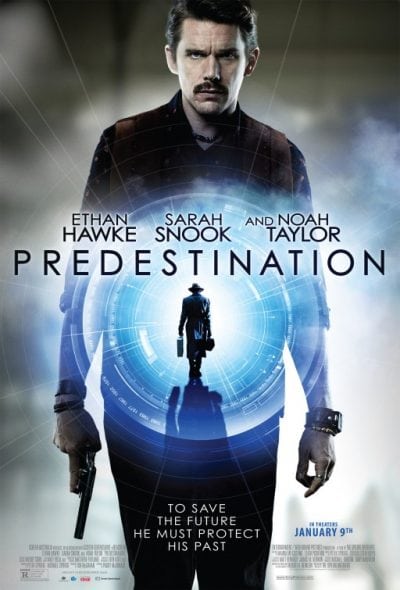
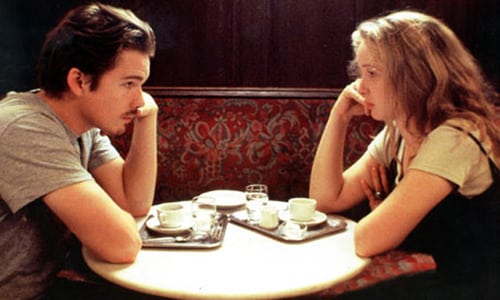
Be the first to comment